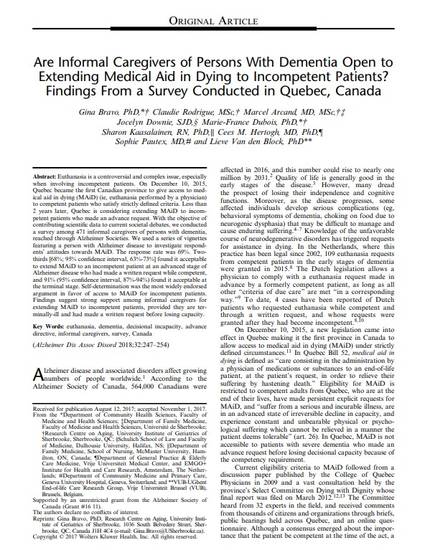
- Euthanasia,
- Medical Assistance in Dying (MAiD),
- Quebec,
- Incompetent Patients,
- Informal Caregivers,
- Alzheimer's,
- Dementia,
- Self-Determination
Euthanasia is a controversial and complex issue, especially when involving incompetent patients. On December 10, 2015, Quebec became the first Canadian province to give access to medical aid in dying (MAiD) (ie, euthanasia performed by a physician) to competent patients who satisfy strictly defined criteria. Less than 2 years later, Quebec is considering extending MAiD to incompetent patients who made an advance request. With the objective of contributing scientific data to current societal debates, we conducted a survey among 471 informal caregivers of persons with dementia, reached through Alzheimer Societies. We used a series of vignettes featuring a person with Alzheimer disease to investigate respondents’ attitudes towards MAiD. The response rate was 69%. Two-thirds [68%; 95% confidence interval, 63%-73%] found it acceptable to extend MAiD to an incompetent patient at an advanced stage of Alzheimer disease who had made a written request while competent, and 91% (95% confidence interval, 87%-94%) found it acceptable at the terminal stage. Self-determination was the most widely endorsed argument in favor of access to MAiD for incompetent patients. Findings suggest strong support among informal caregivers for extending MAiD to incompetent patients, provided they are terminally-ill and had made a written request before losing capacity.

DOI: 10.1097/WAD.0000000000000238